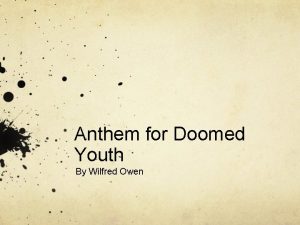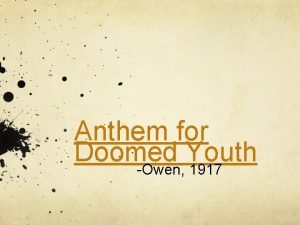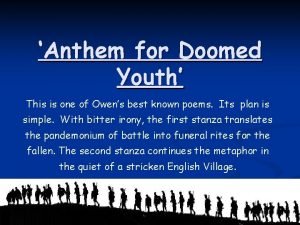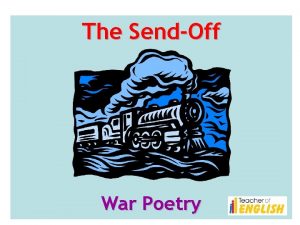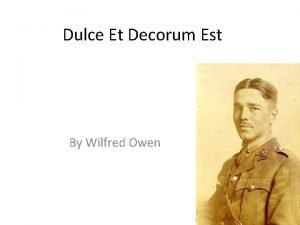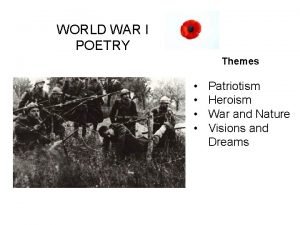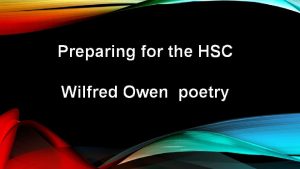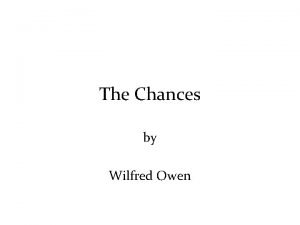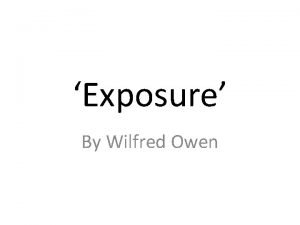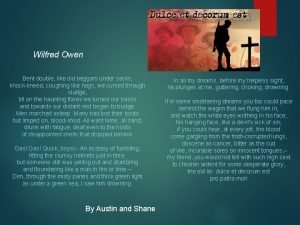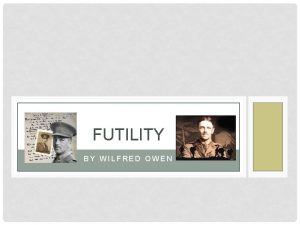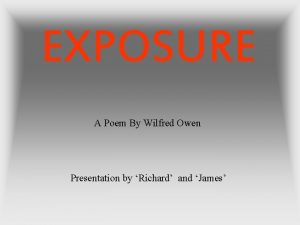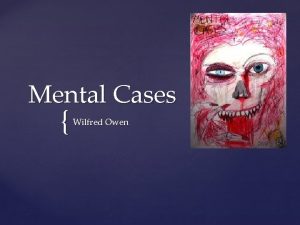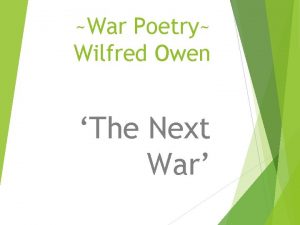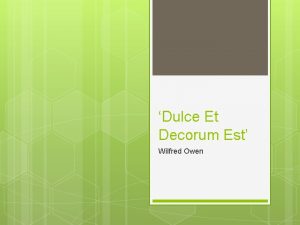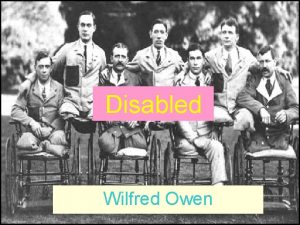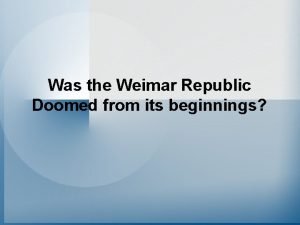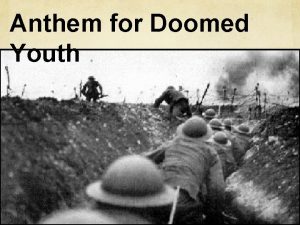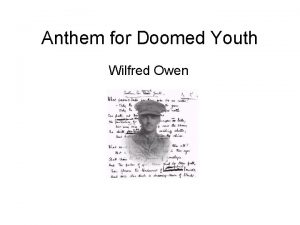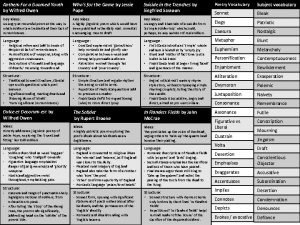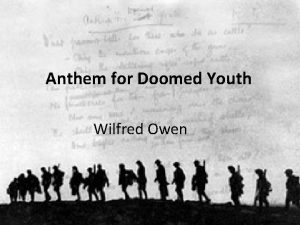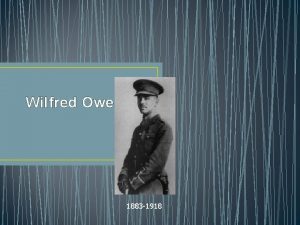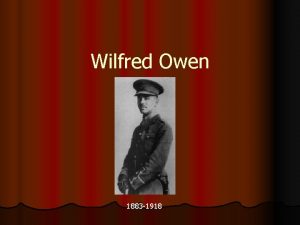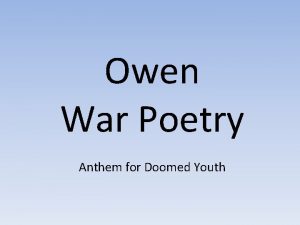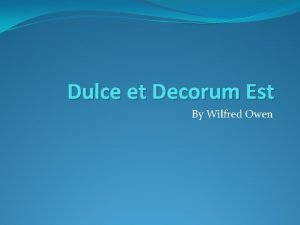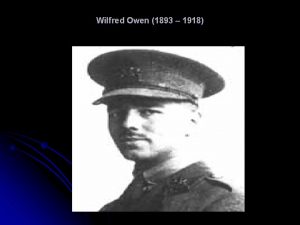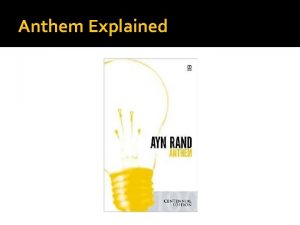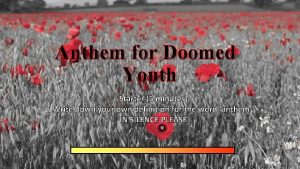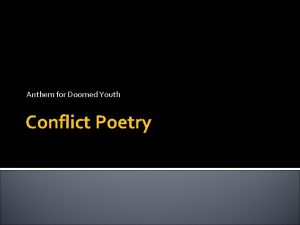Anthem for Doomed Youth Wilfred Owen www englishteaching



















- Slides: 19

‘Anthem for Doomed Youth’ Wilfred Owen www. englishteaching. co. uk

www. englishteaching. co. uk

Re-drafting the poem www. englishteaching. co. uk

Re-drafting the poem www. englishteaching. co. uk

The Final Draft – or is it? www. englishteaching. co. uk

Anthem for Doomed Youth What passing-bells for these who die as cattle? - Only the monstrous anger of the guns. Only the stuttering rifles' rapid rattle Can patter out their hasty orisons. No mockeries now for them; no prayers nor bells; Nor any voice of mourning save the choirs, The shrill, demented choirs of wailing shells; And bugles calling for them from sad shires. www. englishteaching. co. uk

Anthem for Doomed Youth What candles may be held to speed them all? Not in the hands of boys but in their eyes Shall shine the holy glimmers of good-byes. The pallor of girls' brows shall be their pall; Their flowers the tenderness of patient minds, And each slow dusk a drawing-down of blinds. www. englishteaching. co. uk

Anthem for Doomed Youth What passing-bells for these who die as cattle? - Only the monstrous anger of the guns. Only the stuttering rifles' rapid rattle Can patter out their hasty orisons. No mockeries now for them; no prayers nor bells; Nor any voice of mourning save the choirs, The shrill, demented choirs of wailing shells; And bugles calling for them from sad shires. www. englishteaching. co. uk

Point Answers the question Example Usually a quotation Explain the effect Why has the author chosen to use those words? What is the effect on the audience? www. englishteaching. co. uk

What passing-bells for these who die as cattle? Why did Wilfred Owen choose this simile to describe the men? Wilfred Owen uses a simile to describe the soldiers dying in battle. He writes that the soldiers “die as cattle”. This simile is effective because it shows that Owen feels that the men were dying without dignity and that the amount of men dying was like the number of cattle being slaughtered. www. englishteaching. co. uk

Onomatopoeia Personification is giving human qualities to animals or objects. e. g. a smiling moon; dancing flowers is the repetition of initial consonant sounds in neighbouring words. e. g. bouncing ball Alliteration is a word which imitates the sound it represents. e. g. 'splash' sounds similar to the noise of something falling into water. www. englishteaching. co. uk

Personification -Only the monstrous anger of the guns. Only the stuttering rifles' rapid rattle Can patter out their hasty orisons. Onomatopoeia Alliteration www. englishteaching. co. uk

No mockeries now for them; no prayers nor bells; Nor any voice of mourning save the choirs, The shrill, demented choirs of wailing shells; And bugles calling for them from sad shires. Metaphor Personification www. englishteaching. co. uk Onomatopoeia

Anthem for Doomed Youth What candles may be held to speed them all? Not in the hands of boys but in their eyes Shall shine the holy glimmers of good-byes. The pallor of girls' brows shall be their pall; Their flowers the tenderness of patient minds, And each slow dusk a drawing-down of blinds. www. englishteaching. co. uk

The poem contains many images related to funerals, death and mourning. Complete the bubble map by adding all of the funeral images that you can find. ‘choirs’ ‘bugles calling’ ‘sad shires’ Funeral / Death / Mourning Images ‘pall’ ‘flowers’ www. englishteaching. co. uk

‘holy glimmers of good-byes’ ‘choirs’ ‘bugles calling’ ‘bells’ ‘sad shires’ ‘orisons’ Funeral / Death / ‘prayers’ ‘pall’ Mourning Images ‘mourning’ ‘flowers’ ‘candles’ ‘drawing down of blinds’ www. englishteaching. co. uk

Point Answers the question Example Usually a quotation Explain the effect Why has the author chosen to use those words? What is the effect on the audience? www. englishteaching. co. uk

How does Owen use death imagery in his poem? Wilfred Owen uses many images of death, funerals and mourning in the poem ‘Anthem for Doomed Youth’. Choose 2 examples from the bubble map Comment on the effect of your choice of examples. Why did Owen choose to use these images? What do they make the reader think of? www. englishteaching. co. uk

Rhetorical Questions Rhetorical questions are questions that do not require an answer. They are written to make the reader think about the topic being addressed. How does Owen use rhetorical questions in ‘Anthem for Doomed Youth’? Owen uses rhetorical questions at the start of each of the two stanzas of the poem ‘Anthem for Doomed Youth’. He wrote: ‘What passing-bells for these who die as cattle? ’ and ‘What candles may be held to speed them all? ’ Your turn! Why are these two questions effective? What do they make the reader think about / evaluate? What do they tell the reader about the poet’s personal point of view? www. englishteaching. co. uk
 Passing bells poem
Passing bells poem Anthem for doomed youth poetic devices
Anthem for doomed youth poetic devices Anthem for doomed youth metaphor
Anthem for doomed youth metaphor Wilfred grimly
Wilfred grimly Theme of dulce et decorum est
Theme of dulce et decorum est Themes of war poetry
Themes of war poetry Context of dulce et decorum est
Context of dulce et decorum est Wilfred owen poems hsc
Wilfred owen poems hsc Wilfred owen the chances
Wilfred owen the chances Structure of exposure poem
Structure of exposure poem Bent double, like old beggars under sacks technique
Bent double, like old beggars under sacks technique Futility analysis wilfred owen
Futility analysis wilfred owen Exposure wilfred owen summary
Exposure wilfred owen summary Mental cases wilfred owen
Mental cases wilfred owen Wilfred owen the next war
Wilfred owen the next war Exposure by wilfred owen
Exposure by wilfred owen Dulce et decorum est structure
Dulce et decorum est structure Disabled by wilfred owen summary
Disabled by wilfred owen summary Was the weimar republic doomed to fail
Was the weimar republic doomed to fail Who cries over dog biscuits in gatsby
Who cries over dog biscuits in gatsby
